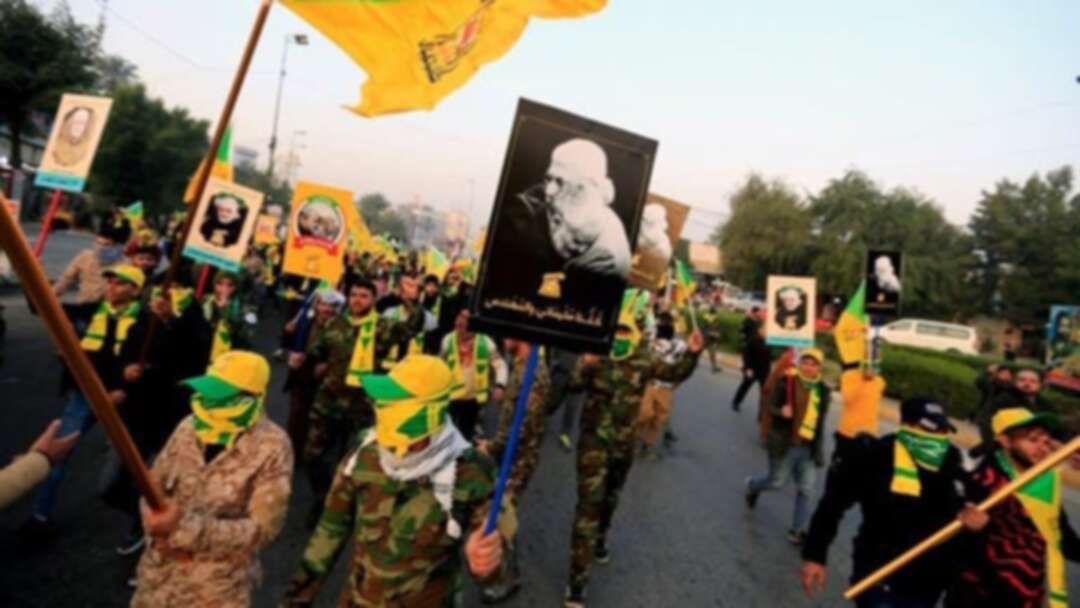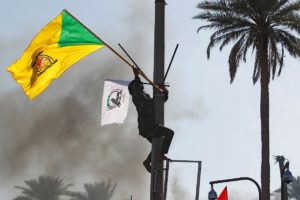-
Threat from Iran to US forces in Iraq remain ‘significant’: Senior US official

The threat from Iranian-backed militia to US forces continues to be “significant,” the US State Department’s senior diplomat for the Middle East said on Thursday, adding that Washington was taking “with a pinch of salt” a ceasefire declaration by Iran-backed Kataib Hezbollah.
Speaking to reporters in a teleconference, David Schenker, Assistant Secretary of Near Eastern Affairs at the US State Department also praised the previous work of Mustafa al-Kadhemi, Iraq’s intelligence chief who was named as prime-minister designate on Thursday.
Iranian-backed militias pose a continuing and “significant” threat to US forces in Iraq, the State Department’s top diplomat for the Middle East said on Thursday, about a week after US President Donald Trump warned of an attack by Iran or its proxies.
Iran-backed paramilitary groups have regularly been shelling bases in Iraq that host US forces, as well as the area around the US embassy in Baghdad.
 David Schenker, Assistant Secretary of Near Eastern Affairs at the US State Department, speaks to Al Arabiya during a previous interview.
David Schenker, Assistant Secretary of Near Eastern Affairs at the US State Department, speaks to Al Arabiya during a previous interview.On Monday, three Katyusha rockets landed near a district in southern Iraq that houses workers for foreign oil companies, including US oil service company Halliburton. No casualties or damage were reported.
Last week, Trump said Iran or its proxies planned a sneak attack on US targets in Iraq and warned they would pay a “very heavy price” but gave no details.
US-Iranian relations have been bitter since the Islamic Revolution toppled the US-backed Shah of Iran in 1979 and ushered in an era of theocratic rule.
While there was a detente with the 2015 Iran nuclear deal, relations have deteriorated with Trump’s decision nearly two years ago to abandon that multilateral agreement and reimpose US sanctions that have crippled the Iranian economy.
 A member of Hashd al-Shaabi holds a flag of the Kataib Hezbollah militia group during a protest to condemn airstrikes on their bases, in Baghdad. (File photo: Reuters)
A member of Hashd al-Shaabi holds a flag of the Kataib Hezbollah militia group during a protest to condemn airstrikes on their bases, in Baghdad. (File photo: Reuters)Worsening tensions, a Jan. 3 US drone strike in Iraq killed Qassem Soleimani, the head of Iran’s elite Quds Force, as well as Abu Mahdi al-Mohandes, who founded Iraq’s Shia Kataib Hezbollah militia after the 2003 US-led invasion of Iraq.
Earlier this week, US Secretary of State Mike Pompeo said the United States proposed a ‘Strategic Dialogue’ with Iraq to be held in June, a bid to restore strained bilateral ties.
Schenker, who in March said Washington was “enormously disappointed” by Iraq’s performance in protecting US-led coalition forces in the country, reiterated that Baghdad needed to take steps if it valued Washington’s partnership.
“It is on the Iraqis - if they value that relationship - to take certain steps and that includes protecting the coalition forces who are in Iraq if they want those forces to remain,” he said.
source: Reuters
You May Also Like
Popular Posts
Caricature
BENEFIT Sponsors BuildHer...
- April 23, 2025
BENEFIT, the Kingdom’s innovator and leading company in Fintech and electronic financial transactions service, has sponsored the BuildHer CityHack 2025 Hackathon, a two-day event spearheaded by the College of Engineering and Technology at the Royal University for Women (RUW).
Aimed at secondary school students, the event brought together a distinguished group of academic professionals and technology experts to mentor and inspire young participants.
More than 100 high school students from across the Kingdom of Bahrain took part in the hackathon, which featured an intensive programme of training workshops and hands-on sessions. These activities were tailored to enhance participants’ critical thinking, collaborative problem-solving, and team-building capabilities, while also encouraging the development of practical and sustainable solutions to contemporary challenges using modern technological tools.
BENEFIT’s Chief Executive Mr. Abdulwahed AlJanahi, commented: “Our support for this educational hackathon reflects our long-term strategic vision to nurture the talents of emerging national youth and empower the next generation of accomplished female leaders in technology. By fostering creativity and innovation, we aim to contribute meaningfully to Bahrain’s comprehensive development goals and align with the aspirations outlined in the Kingdom’s Vision 2030—an ambition in which BENEFIT plays a central role.”
Professor Riyadh Yousif Hamzah, President of the Royal University for Women, commented: “This initiative reflects our commitment to advancing women in STEM fields. We're cultivating a generation of creative, solution-driven female leaders who will drive national development. Our partnership with BENEFIT exemplifies the powerful synergy between academia and private sector in supporting educational innovation.”
Hanan Abdulla Hasan, Senior Manager, PR & Communication at BENEFIT, said: “We are honoured to collaborate with RUW in supporting this remarkable technology-focused event. It highlights our commitment to social responsibility, and our ongoing efforts to enhance the digital and innovation capabilities of young Bahraini women and foster their ability to harness technological tools in the service of a smarter, more sustainable future.”
For his part, Dr. Humam ElAgha, Acting Dean of the College of Engineering and Technology at the University, said: “BuildHer CityHack 2025 embodies our hands-on approach to education. By tackling real-world problems through creative thinking and sustainable solutions, we're preparing women to thrive in the knowledge economy – a cornerstone of the University's vision.”
opinion
Report
ads
Newsletter
Subscribe to our mailing list to get the new updates!






















